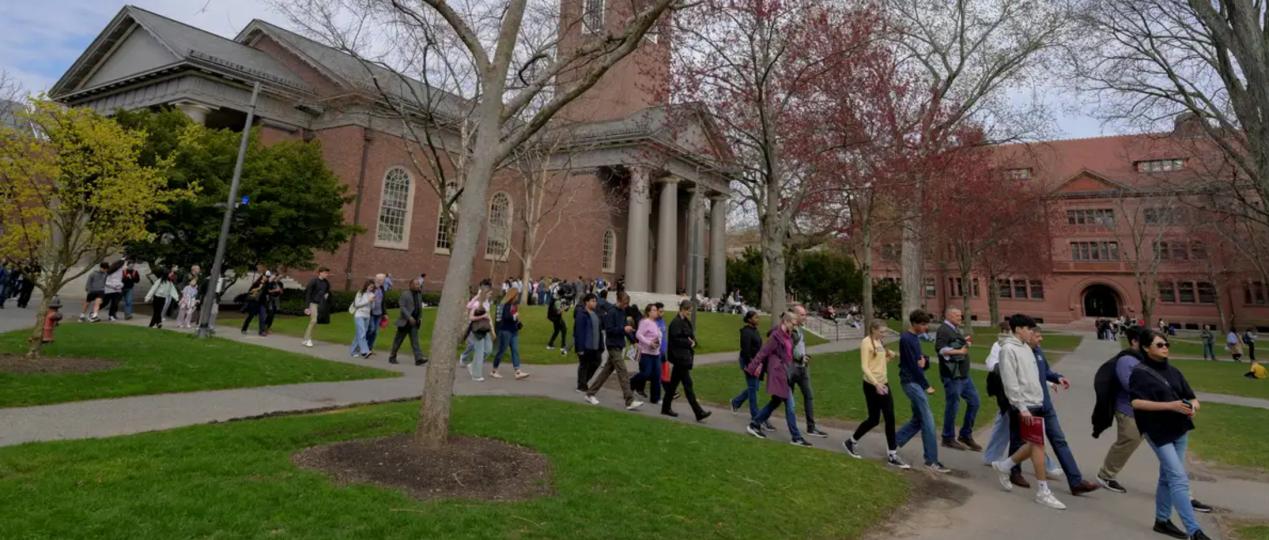
In April 2025, Harvard University sued the Trump administration, and soon after, over a hundred universities jointly issued a statement opposing "political interference". This event became the focus of the conflict between the American higher education sector and the federal government, profoundly reflecting the intense struggle between academic freedom and political intervention.
The cause of the event: The Trump administration's strong pressure
The Trump administration, under the pretext of combating "anti-Semitism", made a series of demands on Harvard University, including closing the diversity, equity, and inclusion (DEI) program, reforming the international student admission policy, and weakening the power of faculty and students in university affairs. When Harvard refused these demands, the Trump administration froze $2.2 billion in federal grants and $60 million in contract funds on April 14, and threatened to freeze an additional $1 billion, revoke tax-exempt status, and cancel the university's eligibility to admit international students. The Trump administration believed that American universities were dominated by "left-wing ideology", especially in campus protests regarding the Israel-Palestine conflict, accusing universities of tolerating anti-Semitism. However, universities like Harvard argued that the administration's demands for rectification were actually an intervention in academic autonomy, such as requiring that admissions and recruitment policies stop considering racial factors and intensifying the review of American values.
Harvard's lawsuit: Defending academic freedom and constitutional rights
Harvard University filed a lawsuit in the federal court of Massachusetts, accusing the Trump administration of illegally freezing over $3.7 billion in federal research funds, attempting to use "funding leverage" to force academic institutions to comply with political agendas. In the lawsuit, Harvard pointed out that the Trump administration had suspended multiple federal grants to Harvard in November 2024 under the pretext of "national security review", including 27 key projects funded by the National Institutes of Health (NIH) such as cancer targeted therapy and antibiotic resistance research, interdisciplinary projects funded by the National Science Foundation (NSF) such as climate modeling and AI ethics, and dual-use research on quantum computing and biodefense technology funded by the Defense Advanced Research Projects Agency (DARPA). Harvard emphasized that 85% of the affected projects were directly related to public health, stating that "delaying research is equivalent to murdering future patients". At the same time, Harvard argued that the administration's freezing of funds did not follow the legal procedures, constituting an "arbitrary and capricious" administrative act, and did not provide sufficient evidence to prove that Harvard had a systemic anti-Semitic problem.
Over 100 universities and academic organizations in the United States, including Princeton University, Brown University, the University of Hawaii, and Connecticut State Community College, have jointly issued a statement in protest of the Trump administration's "unprecedented overreach that endangers American higher education" after Harvard University sued the Trump administration. The statement criticized the government's use of financial means to coerce higher education institutions. It pointed out that the unprecedented overreach and political interference endanger American higher education. "We are open to constructive reform and do not oppose legitimate government regulation, but we firmly oppose the government's improper intervention in campus teaching, life, and work." The signatories cover the three major systems of American higher education, namely state universities, liberal arts colleges, and Ivy League schools.
Impact and Implications: Academic Independence Faces Severe Challenges
This event has had a profound impact on American higher education. For Harvard University, the frozen funds involve major research projects on cancer, Alzheimer's disease, etc., which may lead to research interruptions, personnel losses, and even affect the economy of Massachusetts. At the same time, the Department of Homeland Security's threat to revoke Harvard's qualification to recruit international students will also affect Harvard University's global competitiveness. From a broader perspective, the global reputation of American universities may be damaged due to political interference in scientific research, exacerbating the brain drain. Although Harvard has a $53.2 billion endowment fund, 70% of the funds are restricted in their use and cannot fill the short-term funding gap. If federal grants are frozen for a long time, Harvard may be forced to cut its budget or rely on high-interest loans.
The lawsuit filed by Harvard against the Trump administration and the joint statement by over 100 universities against "political interference" highlight the predicament of American higher education in the face of political interference. The game between academic freedom and political power continues, and the future development of American higher education is full of uncertainties, which also triggers global deep thinking on academic freedom and the rule of law.

Amidst the global wave of technological transformation, artificial intelligence (AI) has become a key focus of competition among major tech giants.
Amidst the global wave of technological transformation, art…
In January 2026, the remarks by US Treasury Secretary Besse…
Less than three weeks into 2026, transatlantic trade relati…
On January 17, 2026, the Trump administration, under the pr…
When Musk set the goal of achieving a launch frequency of m…
A week after the largest nationwide protests in years, the …